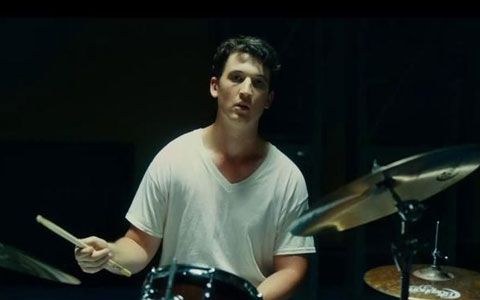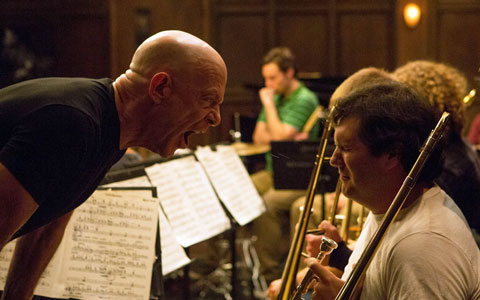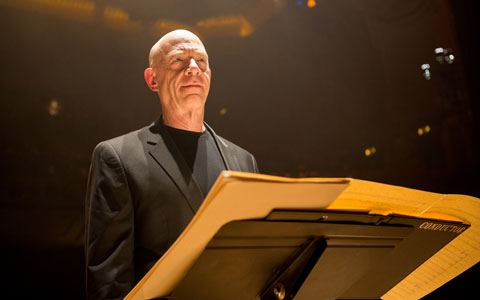Burning passion, intense desire and human frailty clash head on in this gripping and explosive story about the warfare between ambitious young jazz drummer Andrew Neiman (Miles Teller) and his tyrannical and ferocious teacher Terence Fletcher (JK Simmons), featuring stupendous performances from both actors.
Plagued by the failed writing career of his father, Andrew hungers day and night to become one of the greats. Terence Fletcher, an instructor equally known for his teaching talents as for his terrifying methods, leads the top jazz ensemble in the school. Fletcher discovers Andrew and transfers the aspiring drummer into his band, forever changing the young man's life.
Andrew's passion to achieve perfection quickly spirals into obsession, as his ruthless teacher continues to push him to the brink of both his ability-and his sanity.

Andrew's maniacal effort to achieve perfection is further fuelled by Fletcher's psychological brinksmanship. The nearer to perfection Andrew gets, the narrower his circle of intimates becomes until he is left only with Fletcher-and even that relationship is jeopardised by the ferocity of Andrew's ambitions.
A journey that can be seen alternately as a descent into madness or an ascent to greatness comes to a crescendo on the biggest platform for Andrew's talents-the unforgiving stage of Carnegie Hall.
Says 29-year-old writer-director Damien Chazelle: "There are a lot of movies about the joy of music. But as a young drummer in a conservatory-style high school jazz orchestra, the emotion I felt the most frequently was a different one: fear. Fear of missing a beat. Fear of losing tempo. Most overwhelmingly, fear of my conductor. With Whiplash, I wanted to make a movie about music that felt like a war movie, or a gangster movie - where instruments replaced weapons, where words felt as violent as guns, and where the action unfolded not on a battlefield, but in a school rehearsal room, or on a concert stage.
The idea for a story about a promising musician pushed to the limits of his endurance by an abusive mentor was inspired by director's own youthful experiences.
Whiplash, which won both the Grand Jury Prize and the Audience Prize at the 2014 Sundance Film Festival and earned rave reviews when it played at the Cannes Film Festival, is at least partly autobiographical, he says.
Back in 2011, Chazelle was living in Los Angeles and struggling with a different script when he decided to work on Whiplash.
"It was basically the most autobiographical thing I had written," he says. "I was a jazz drummer in a competitive jazz orchestra with a teacher that had this kind of philosophy, and I had these very severe, still very strong memories of that. The teacher himself wasn't the level of this guy, but it posed the same kind of questions for me.
"So I decided, okay, I'm going to push it even further, I'm just going to write it. I wrote it really fast and then just kind of sat on it for a while. Finally - we're probably into 2012 now - I showed it to some producers and it got into the hands of both Jason Reitman's company, and Jason Blum's company, and they wound up pairing up.
"To help raise money for what was not exactly the most commercial script ever written, they had the idea to do a short - to basically pull a scene from the script and do it cheaply in a couple of days - just to give people an idea of what the style would be.
"So we shot that, took it to Sundance and that helped to get it seen, and open some doors. Then we found financing a few months after that, then we shot the feature the next autumn and we took that back to Sundance. It became a very fast process, but only once the short was out there."

Chazelle admits that writing Whiplash was cathartic. "It was in a way. I've had nightmares once a month since high school about this jazz ensemble, and I naively thought that writing this script would expel the nightmares, and that hasn't happened.
"In my case it was high school, so I wanted to change the milieu, to up the stakes to a Julliard-type place, and it also meant that there was more room for an even harder professor.
"I wanted to rub away any of the sympathetic qualities in my professor and really make someone who makes you question it, no matter how good the music might be. He really had to be monstrous enough to make you think that this is not worth it. That would be the whole question that animated the film: At what point does art not justify the means?"
In Whiplash, Fletcher is the ultimate classroom bully - a man who will pick on the students who aren't performing to the level he requires and prey on their weaknesses.
"I was aged from 14 to 18 when I played in the ensemble and in the movie the characters are 18 to 22. In my case, I never considered playing professionally. It started as a hobby, and it was really because of this teacher that I got obsessively into it, but it was really a phase.
"It was a pressure-cooker situation, and at the time it felt like life or death, but it was a phase, and movies came first for me. I wanted to make a movie about the other version of me - the version that could have considered going professional with music.
"It's that moment when you're not really sure whether you have exactly what it takes, and when you're very vulnerable - that extremely vulnerable moment - and somebody can come in and really f*** with that."
Finding an actor who could convincingly play Andrew, a talented musician, was the key to the success of the film, he says.

"There was a lot of discussion: 'How are we going to find someone for the role? Should we be looking at drummers? Should we be looking at actor-drummers?' and I sort of made a decision early on that everyone in the movie, as much as possible, I wanted to be a real musician, even if it meant not actually being real actors.
"Most of the people in the band, other than Miles and the drummers he works with, are all musicians. That was important to me, but I sort of decided, just because of the demands of the arc, that ultimately the movie was less about the actual technical musicianship and more about the emotional journey, so I just had to look for the best actor there was, and then try to teach him how to drum.
"The lucky thing with Miles is that even before I really knew anything about his musical experience, I saw him in Rabbit Hole, fell in love with him, and wanted him to do the movie.
"I found out, once we were getting close to actually casting, that he did have some drumming experience. It was just one of those lucky things. He knew his way around a kit, and he's also a superb mimic, and just superb at picking things up really quickly.
"What we had to do was give him a crash course in hard-core jazz drumming, teach him the right grip, teach him the right sort of moves, and formalise his training, because he'd never really had a lesson, and so we did that and he just took it upon himself to practise like a crazy person."
To capture the emotions Chazelle felt in his drumming years, he wanted to shoot each musical performance in the movie as though it were a life-or-death contest - a car chase, say, or a bank robbery. "I wanted to showcase all the details I remembered - all the dirt and grime and effort that go into a work of music. The earplugs and broken sticks, the blisters and cut hands, the incessant counting and the beeping metronomes and the sweat and fatigue. At the same time, I wanted to capture those fleeting moments of beauty that music allows-and that film can so movingly capture."
"When you listen to a Charlie Parker solo, you enter a state of bliss. Was all the suffering Parker endured for his art worth it, just so we could enjoy the results decades later? I have no idea, but to me it's a question worth asking, one that reaches beyond music - beyond even the arts- and touches on a concept that's so simple but so fundamental to the American character: greatness at any cost."
Make sure not to miss Whiplash. It guarantees to have you on your edge of your seat and break your heart with its gut-wrenching emotion.
Read more about Whiplash and other new films opening this week at www.writingstudio.co.za
